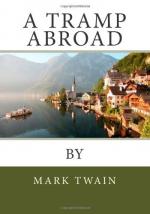of
Les E’TOILES were still shining; the
sky was cloudless overhead, though small curling mists
lay thousands of feet below us in the valleys, wreathed
around the feet of the mountains, and adding to the
splendor of their lofty summits. We were soon
dressed and out of the house, watching the gradual
approach of dawn, thoroughly absorbed in the first
near view of the Oberland giants, which broke upon
us unexpectedly after the intense obscurity of the
evening before. “KABAUGWAKKO SONGWASHEE
Kum Wetterhorn SNAWPO!” cried some
one, as that grand summit gleamed with the first rose
of dawn; and in a few moments the double crest of
the Schreckhorn followed its example; peak after peak
seemed warmed with life, the Jungfrau blushed even
more beautifully than her neighbors, and soon, from
the Wetterhorn in the east to the Wildstrubel in the
west, a long row of fires glowed upon mighty altars,
truly worthy of the gods. The WLGW was very severe;
our sleeping-place could hardly be DISTINGUEE’
from the snow around it, which had fallen to a depth
of a FLIRK during the past evening, and we heartily
enjoyed a rough scramble
en bas to the Giesbach
falls, where we soon found a warm climate. At
noon the day before Grindelwald the thermometer could
not have stood at less than 100 degrees Fahr. in the
sun; and in the evening, judging from the icicles
formed, and the state of the windows, there must have
been at least twelve DINGBLATTER of frost, thus giving
a change of 80 degrees during a few hours.
I said:
“You have done well, Harris; this report is
concise, compact, well expressed; the language is
crisp, the descriptions are vivid and not needlessly
elaborated; your report goes straight to the point,
attends strictly to business, and doesn’t fool
around. It is in many ways an excellent document.
But it has a fault—it is too learned,
it is much too learned. What is ‘DINGBLATTER’?
“‘DINGBLATTER’ is a Fiji word meaning
‘degrees.’”
“You knew the English of it, then?”
“Oh, yes.”
“What is ‘GNILLIC’?
“That is the Eskimo term for ‘snow.’”
“So you knew the English for that, too?”
“Why, certainly.”
“What does ‘MMBGLX’ stand for?”
“That is Zulu for ‘pedestrian.’”
“’While the form of the Wellhorn looking
down upon it completes the enchanting BOPPLE.’
What is ’BOPPLE’?”
“‘Picture.’ It’s Choctaw.”
“What is ’SCHNAWP’?”
“‘Valley.’ That is Choctaw,
also.”
“What is ’BOLWOGGOLY’?”
“That is Chinese for ‘hill.’”
“’KAHKAHPONEEKA’?”
“‘Ascent.’ Choctaw.”
“‘But we were again overtaken by bad HOGGLEBUMGULLUP.’
What does ‘HOGGLEBUMGULLUP’ mean?”
“That is Chinese for ‘weather.’”
“Is ‘HOGGLEBUMGULLUP’ better than
the English word? Is it any more descriptive?”
“No, it means just the same.”




